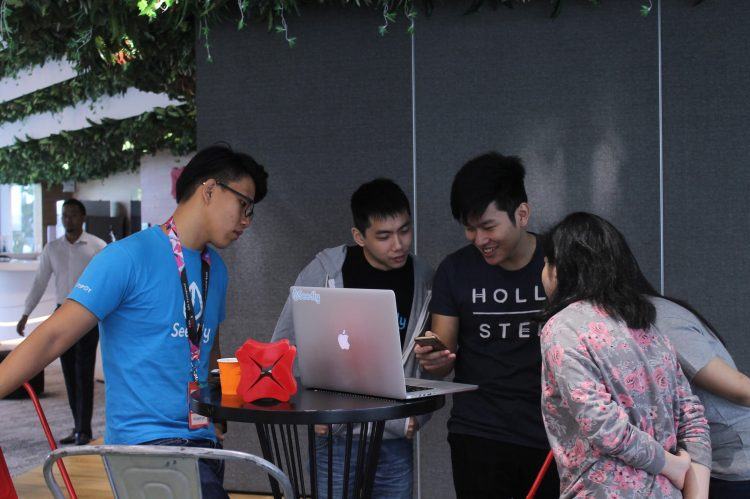
Photo credit: DBS.
The saying “good talent is hard to find” seems cliched, but the sentiment behind it still rings true. Hiring just isn’t easy.
This problem gets tougher in a relatively new avenue like fintech, which saw US$19.1 billion in global investments in 2015 alone – a sign that it is heating up quickly. Fintech is one industry “most affected by digital disruption,” says Lionel Lim, VP of Asia Pacific and Japan at Pivotal, a software and services company.
“A growing chorus of customers are demanding more convenient and immersive digital banking experiences, coupled with global economies becoming more intermingled—requiring banks to be open 24/7, while seamlessly working across borders,” says Lionel.
Yet it lacks the talent needed to support its growth.
Why’s building a tech team so tricky? How can you build an effective one? We spoke to a few fintech and tech players to learn more.
Recognize diversity

Photo credit: Verkeorg.
One of the biggest issues faced when hiring a tech team: technology is extremely diverse. The product or service can range from cloud services to cryptocurrency. The experience, and thus the staff, differs widely from company to company.
Equally, different types of companies attract different breeds of workers. Applicants to an early-stage startup would have different expectations from someone applying to a bank. But diversity is key — you don’t always need a fresh grad hustler’s energy. Sometimes, you also need to tap into the experience of a seasoned professional.
This divide can make it hard to find talent to help a startup grow, says Elvin Zhang, founder of Toucan Pay. The startup sits in a fintech segment that requires engineers experienced in enterprise infrastructure, a breed of talent that isn’t typically drawn to startups.
Diversity is key — you don’t always need a fresh grad hustler’s energy.
The best way to find the right person within a large pool of candidates? Find the right channels. Several job portals are dedicated to people looking to work in a startup, such as StartupJobsAsia, Glints, and even Tech in Asia Jobs.
You also shouldn’t limit yourself to the country you’re in. Talent can be found anywhere, observes Coinpip founder Anson Zeall.
“Singapore is great at grooming tech talent. But to be good at fintech, it does take a few more years as attention to detail is crucial in fintech. At the end of the day, you’re dealing with money and finance. One wrong calculation can be quite disastrous,” says Anson.
Emphasize culture fit

DBS Asia X, DBS’s newest co-working space. Photo credit: Tech in Asia.
Nonetheless, Toucan Pay’s Elvin says that a big driving force behind his hiring decisions is culture fit. With an 8-man team, he admits to being picky with his selections. His experience working in a VC has taught him that the first 10-20 people he hires can make or break his company. In a ten-person team, there’s a 10 percent chance that one person can change the culture.
In a ten-person team, there’s a 10 percent chance that one person can change the culture.
And with Southeast Asia’s fintech scene playing catch-up with larger ecosystems like China’s, the attitude of your company has to be good to survive.
“If your culture isn’t good, there’s no way you can keep up,” says Elvin.
Larger organizations are also recognizing this, and are looking to hire people possessing what has been called the “startup mentality” — a term defined by Startup Britain founder Michael Hayman as “fierce activity, urgently undertaken with the keenest sense of its impact on the present.”
“I’d much rather bootstrap than screw up the initial culture,” says Elvin.
Stay in touch with customers

Photo credit: Pexels.
Anson Zeall, founder of CoinPip, shares that he finds that the roles he finds toughest to fill are middle management — the people with both technical experience and business acumen. It’s an interesting niche that requires people who can understand and fill the gap between product and consumer.
This isn’t just a problem faced by startups — it is also faced by large companies. Daniel Ng, senior director, APAC of Cloudera says that the biggest gap in hiring lies in candidates technical know-how and business acumen. Roles like Sales Engineer or Business Solution Owner, for example, will need both.
“Knowing how to leverage big data, for example, is no longer just an IT problem – all departments, across all businesses and industries, need to know how to gain real value from data,” says Daniel.
Engineers can’t afford to be disconnected from customers, stresses Nick Walton, head of ASEAN at Amazon Web Services.
“We keep iterating and listening to our customers on what they care about to keep building. We are constantly looking for talents who can keep innovating on behalf of our customers,” says Nick.
Get creative

Photo credit: Pexels.
Recruiters, according to Elvin, are still his biggest source of leads. However, the exercise can be long and tedious, and good developers can be hard to discover in the traditional hiring process.
To deal with this situation, DBS launched Hack2Hire to help suss out the right applicants. With 100 roles to fill, this is the first time the bank has hired through hackathons.
[pull quote]Engineers can’t afford to be disconnected from customers.[/pullquote]
Hackathons may have lost popularity in recent years, but DBS still sees the process as a good way to shorten the hiring process significantly. While the usual way into DBS’s tech team requires several rounds of assessment, Hack2Hire involves just two rounds of assessment with the second round taking just 48 hours before selected candidates learn if they have been offered a role.
“We want to bring developers well-versed in these new technologies into the bank to accelerate our digital transformation efforts,” said Soh Siew Choo, DBS’ group head of core systems technology.
Successful applicants will work on coding for projects related to data analytics, machine learning, and cloud-native application development. These projects span the entire spectrum of the bank – from enhancing customer experience to digitalizing finance operations.
Connecting with tech talent also means staying in tune with the community. Part of that means really emphasizing collaboration in the workplace and a tech team’s day-to-day.
Daniel added, “The collaborative spirit is a huge part of the open source community and we truly believe in it as part of our team or hiring culture as well.”
—
DBS is hiring 100 developers skilled in new and cutting-edge technologies, as it ups the ante on reimagining banking.
Through DBS Hack2Hire, participants will be leveraging the latest technology to develop mission-critical applications from scratch. You’ll design, develop, test and deploy new applications as part of the strategic transformation program, using Agile, cloud technologies, microservices and Big Data.
Apply for DBS Hack2Hire today! Registration closes 12 March, 11.30PM (GMT +8).

This post How to hire for innovation, according to fintech founders. appeared first on Tech in Asia.
from Tech in Asia https://www.techinasia.com/hire-innovation-fintech-founders
via IFTTT
No comments:
Post a Comment